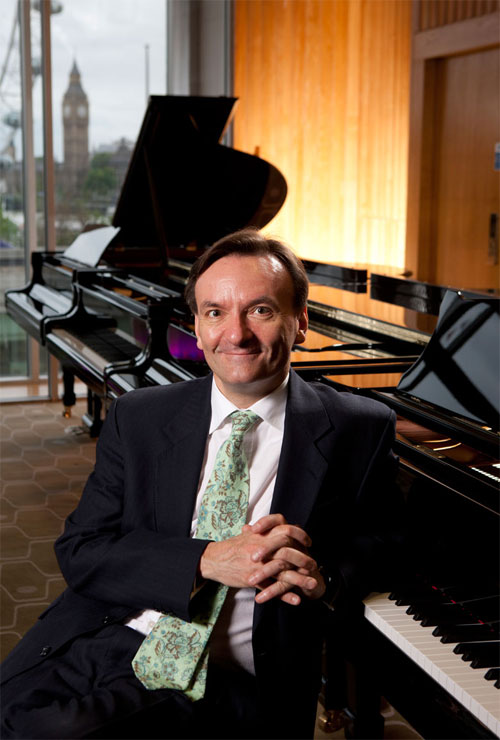Stephen Hough offers mesmerizing artistry for Friends of Chamber Music
Stephen Hough presented a program of classics rediscovered for Friends of Chamber Music of Miami on Wednesday evening at the Temple Beth Am in Pinecrest. The juxtaposition of the sensuous imagery of Debussy with the romantic longing of Schumann and the ardent uneasiness of Beethoven was set to reveal their opposite approaches to the exploration of sonorities of the piano.
As a pianist, writer, and composer, Stephen Hough is a modern example of the well-rounded artist whose contribution to multiple art forms is not only relevant today, but will also leave a mark for the future generations.
This concert was one of those rare occasions where a two-hour program flies by and at the end you find yourself mesmerized by the magic of the performances.
Music of Debussy opened each half of the program; “Clair de lune” (from Suite Bergamasque) and Images Book II on the first, and “La terrase des audience au clair de lune” (from Préludes, Book II) and Images Book I on the second.
Hough’s ability to transcend definitions of dynamics and provide an enveloping palette of soft sonorities offered a new dimension to Debussy’s music. In Image II, the charming character and textural changes showcased his eloquent technique, while his tone production allowed for even the softest sounds to blossom vibrantly.
Hough captured the spirit of Debussy’s music by convincingly suggesting sensual images with a clear vision that took the audience by the hand and led them through a myriad of soundscapes. Movements such as “Poison d’or” (Image II) or “Mouvement” (Image I) sounded effortless and easy under his subtle touch. Evoking the effects of gurgling water or fish jumping may seem doable conceptually, yet to vividly translate those into the piano requires an absolute command of the instrument. Hough managed to project a bird’s eye view of the music with calculated pacing and tone consistency that warmly supported the build-ups, displayed timbral diversity, and elicited time-stopping stillness.
The two monumental works–sonic antagonists to the Debussy–were Schumann’s Fantasie, Op. 17, and Beethoven’s “Appassionata” Sonata in F minor, Op. 57. Each presents their composers’ particular musical languages, and are powerful declarations of the longing of the human heart—as well as technically challenging in their demand of passionate, yet cool-headed playing.
In the Fantasie, Hough showcased his individuality with fresh articulation and timing, never overindulging and thus allowing for the music to take flight. Although the venue acoustic removed some of the edge from his loud dynamics, the grandiose moments of the second movement stood strong and he breezed through the hellish coda with an uncompromising sense of direction and musicality. In the third movement, taken at a faster tempo than customary, Hough exposed its overarching structure and motivic development where both climaxes, meticulously paced, resounded triumphantly.
Hough’s consistency of articulation took center stage in his rendition of the first movement of “Appassionata” in the unwavering, nearly menacing presence of the repeated notes and as he eluded sentiment in the first theme by exaggerating the double-dotting of the melody. The second movement flowed at a relatively fast pace, which in retrospect aided the continuity of tempo in all variations.
The incendiary and agitated third movement surged steadily until the explosive coda. Hough’s wave-like shaping of the passages at times detracted from their intensity; however, there was no doubt throughout the entire performance that his vision was laser-focused and that each artistic choice was fully in service of the music, beyond what is written on the page.
After a well-deserved standing ovation, Hough wrapped up the evening with the exquisite fifth posthumous variation from Schumann’s Études Symphonique.
Friends of Chamber Music of Miami continues its 62nd season with the Kalichstein-Laredo-Robinson Trio and violist Cynthia Phelps on January 7 at UM Gusman Concert Hall in a program with music by Beethoven, Dvorak, and Brahms. http://miamichambermusic.org
Posted in Performances
Leave a Comment
Thu Dec 7, 2017
at 1:35 pm
No Comments
